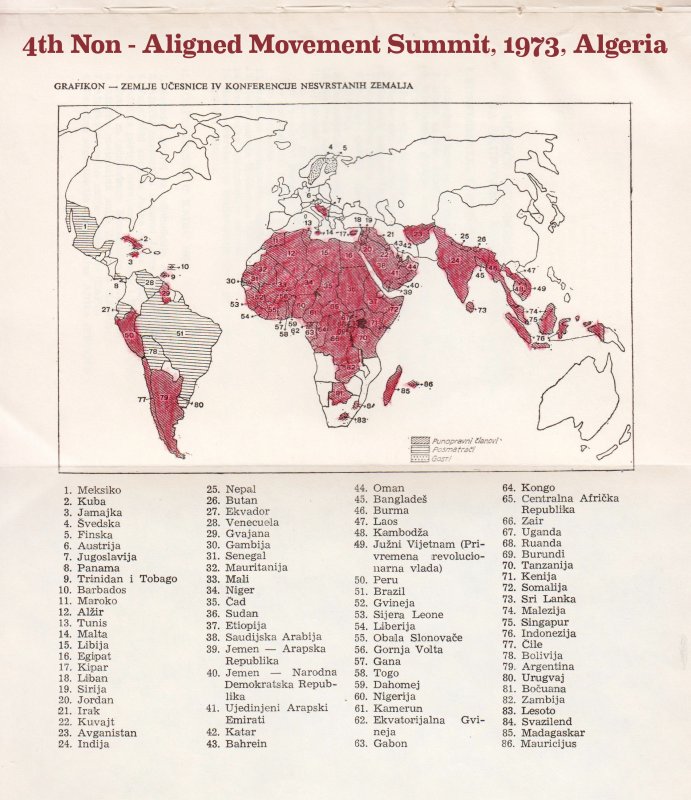
The non-aligned contemporaneity? | International Conference

Conference will be dedicated to the question how to harness the historical visions of the non-alignment movement (NAM) in the light of the current global geopolitical situation. Another important question will tackle the legacy of culture in the spirit of NAM's internationalism and its potentials for the present day.
Naturally, these questions should not be considered as part of some kind of exoticism linked to the past, nor should they harbor nostalgia for the movement itself, for as we know, what many NAM states actually practiced was quite far from the principles the movement promoted. From today's perspective, the concepts of nation-states, identity politics, and exclusive national cultures, which appeared in the cultural political agendas of the time, can be seen as highly problematic. The concept of solidarity also needs to be treated with caution: with whom are we solidary, and how are we solidary? How can we avoid the “white savior complex”? And what should be done with the fact that Syria, Pakistan, Libya and most African states are still members of the NAM?
Nevertheless, the movement should not be forgotten in so far as it envisioned forms of politics that took as their starting point peoples and societies that had been forcibly relegated to the margins of the global economic, political and cultural system. The movement also proposed new models that “enabled people to live and not merely to survive” (Svetlana Alexievitch). The struggle against poverty, inequality, and colonialism in the world system, coupled with trans-national solidarity could be useful in a reconsideration of the history and legacies of the NAM today, at a time when colonialism has yet again become more than evident.
However, to truly reconsider the legacy of the NAM in the cultural framework of today more radical measures would need to be considered – not only on the declarative level, but on practical, applicative levels: on the level of governance, knowledge production and heritage. Next, it would be necessary to translate these new formats and concepts into the spaces of policymaking, not only into those of art and culture, but also in relation to the state, national welfare, and the mechanisms of public administration.
These are some of the topics planned for discussion at the conference.
Speakers: Fernanda Carvajal, Dóra Hegyi & Eszter Szakács,Tvrtko Jakovina, Joy Mboya, Vali Mahlouji, Vera Mey, Igor Štiks
More info: biographies and abstracts.
PROGRAMME
Monday, 27 May 2019, 6 p.m.
18:00 - 18:15 welcome by Zdenka Badovinac, director of the Moderna galerija and Bojana Piškur, curator of the exhibition Southern Constellations: The Poetics of the Non-Aligned
18:15 - 19:15 Tvrtko Jakovina: On the Relevance of Small Countries
How Yugoslavia discovered non-alignment and became the Third World leader, opening talk
Tuesday, 28 May 2019, 1:30 - 6:30 p.m.
13:30 - 14:00 Igor Štiks: The 21st-century Left and the Spectres of Yugoslav Socialism: Anti-Fascism, Non-Alignment, Self-Management and Multinational Federalism
14:00 - 14:30 Fernanda Carvajal: Traces to resist the present. Towards a non-aligned genealogy of the Southern Conceptualisms
14:30 - 15:00 Dóra Hegyi & Eszter Szakács: Mezosfera Magazine: A Proposition for a Pan-Peripheral Network
15:00 - 15:15 break
15:15 - 16:00 discussion moderated by Bojana Piškur
16:00 - 16:30 Vera Mey: Artistic Alignment in Southeast Asia: case studies exploring a "geographic horizon" of the art and visual culture of the region
16:30 - 17:00 Joy Mboya: Cultural Undertakings as acts of Nation Formation in Post-colonial African States: the case of The GoDown Arts Centre, Nairobi, Kenya
17:00 - 17:30 Vali Mahlouji: The Shifting Sands of Utopias
17:30 - 17:45 break
17:45 - 18:30 discussion, moderated by Tjaša Pogačar Podgornik
VIDEO DOCUMENTATION